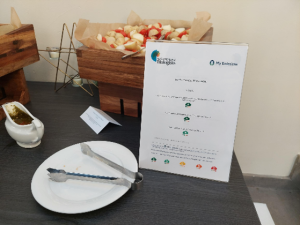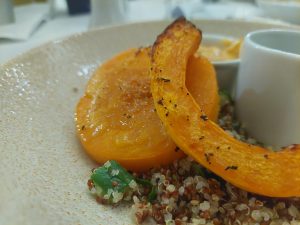11 April 2024

At any event food is an integral part of your attendees’ experience. However, managing the impact of food choices is not straightforward in terms of sustainability. In this blog, we look at some more tips to help make the menus at your upcoming events more sustainable. In case you missed it, check out part 1 of this guide.
Carbon footprint
As mentioned in our previous blog, The Company of Biologists’ Workshop programme has been prioritising local, seasonal and organic ingredients for our event catering. Since November 2023 we have also started to calculate the carbon footprint of our lunch and dinner menus to improve our understanding of their environmental impact. This system uses a life cycle analysis for each ingredient to evaluate their carbon footprint from the farming process until they arrive in the store. To make this possible, we collaborate with My Emissions, one of the many companies that offers carbon-labelling services for food.
 These estimations help to not only decrease the environmental impact of meals at events, but also to identify the main reasons behind it. One key point the estimations highlighted for our Workshops was that that the main source of our menus’ carbon footprint was the intensive process of farming required for certain products.
These estimations help to not only decrease the environmental impact of meals at events, but also to identify the main reasons behind it. One key point the estimations highlighted for our Workshops was that that the main source of our menus’ carbon footprint was the intensive process of farming required for certain products.
We learned that ingredients such as beef, lamb and chocolate have a very high carbon footprint and for this reason, we have decided to cut back on these key ingredients to help us reduce emissions for future Workshops. Calculating the carbon impact of food served at our events was of great help to us, allowing us to make more informed decisions when setting our menus. At our first 2024 Workshop, we managed to halve our lunch and dinner menus’ emissions to an average of 536 g CO2 e/serving. This is a very low carbon footprint score, meaning that we have reached our first goal for sustainable Workshops in 2024. Many thanks to everyone that helped us in this process.
Check out our previous blogs if you would like to learn more about our carbon labels scores and the other targets we have set ourselves for our 2024 Workshop programme.
Other environmental impact
As well as the carbon footprint, it is important to also think about the potential biodiversity impact that food production causes, which is not directly related to carbon footprint calculations. The demand for ingredients such as soy, palm tree oil and cattle commodities are some of the main causes of deforestation 1 2 and drivers for habitat loss and soil degradation 3 4.
These collateral losses are hard to quantify and track, but not impossible to avoid. Becoming informed about the main agriculture products that lead to biodiversity loss, prioritising organic food 5 and avoiding mass-produced ingredients or meat from animals that are usually fed on soy-derived feed 6 are just some actions we can take to make a difference.
Certifications and community growth
 Social and ethical implications of a meal should also be considered when making a choice of what to eat. Join forces with suppliers that are ethically certified to make sure that everything you put on your plate is produced responsibly.
Social and ethical implications of a meal should also be considered when making a choice of what to eat. Join forces with suppliers that are ethically certified to make sure that everything you put on your plate is produced responsibly.
Choosing locally produced food empowers local communities and promotes economic growth by supporting the development of small businesses. These are fundamental factors in fighting climate change and in supporting the Sustainable Development Goals.
Final thoughts
With careful planning, it is possible to have both tasty and eco-friendly food on the same plate. Step by step, by collaborating with chefs and suppliers that share your vision, you can create a wonderful culinary experience while also minimising your impact on the planet.








You must be logged in to post a comment.